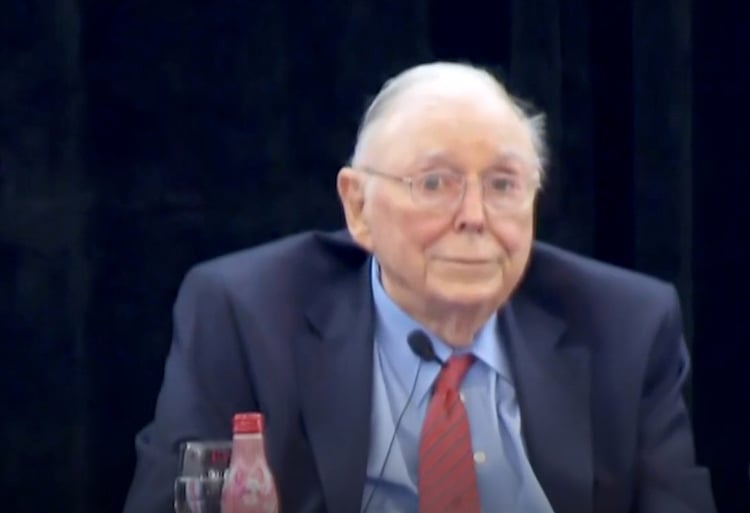If you believe that bad things come in threes, then it was a big week for geopolitics, music and investing.
A prominent trio paid the ferryman within days: Henry Kissinger, the controversial former US Secretary of State and security adviser to presidents Nixon and Ford, died aged 100; Shane MacGowan, the charismatic Irish poet and frontman for The Pogues, aged 65; and first up, Charlie Munger, the down-to-earth billionaire who was Warren Buffett’s right-hand man at Berkshire Hathaway for 45 years, just short of his 100th birthday.
Munger was still sharp and on point with his investment advice in an interview just a few weeks ago. But from a startup perspective, it was his views on cryptocurrency and venture capital that made him memorable in recent years.
He had a blunt, quick-witted and droll turn of phrase and also offered so good life advice founders can take to heart. His quips were dubbed “Mungerisms”.
Among Startup Daily’s favourite Charlie Munger quotes were:
“Capitalism without failure is like religion without hell.”
And:
“Any year that passes in which you don’t destroy one of your best-loved ideas is a wasted year.”
Munger told the Wall Street Journal in 2019 that it’s “part of the reason I’ve been a little more successful than most people. I’m pleased when I can destroy an idea that I’ve worked very hard on over a long period of time.”
He also offered advice that would be handy on the walls of every investor’s office.
“It’s so simple. You spend less than you earn. Invest shrewdly, and avoid toxic people and toxic activities, and try and keep learning all your life, et cetera et cetera. And do a lot of deferred gratification because you prefer life that way. And if you do all those things you are almost certain to succeed. And if you don’t, you’re going to need a lot of luck.”
And while Elon Musk was busy telling people like Disney CEO Bob Iger to “go f*ck yourself” for not advertising on his site hustle, formerly known as Twitter, Munger recently declared “to hell with them!” of venture capitalists.
When reminded of his quip that “You want to hire the guy with an IQ of 130 who thinks it’s 120. And the guy with an IQ of 150 who thinks it’s 170 will just kill you,” in 2019, he responded “You must be thinking about Elon Musk”.
Just gambling
For Munger, perhaps it was party to do with competition as an investor. Back in 1989, Buffet paid tribute to his vice president in his annual chairman’s letter, saying “It’s far better to buy a wonderful company at a fair price than a fair company at a wonderful price. Charlie understood this early; I was a slow learner.”
Asked recently by the Wall Street Journal if Berkshire Hathaway would make another big acquisition, Munger said: “It’s at least 50/50. Venture capital has made it so difficult for everybody. They keep bidding the prices up and up and up, and of course that makes the results go down, down and down.”
Munger went further on the Acquired podcast saying that: “It’s very difficult to invest money well, and I think it’s all but impossible to do time after time after time in venture capital… Some of the deals get so hot, and you have to decide so quickly, that you’re all just sort of gambling.”
His chat with Acquired didn’t have a lot of love for US VCs. The man worth more than A$3 billion, who lived in the same house for seven decades, lumped VCs in the same category as bankers and consultants as people to avoid.
“I’d rather just operate with my own money. That is a much better way of doing it than to be forced to sell, or to deal with investment bankers, investment consultants, venture capitalists,” he said.
“The hell with them — you don’t need other people. The point of getting rich is you don’t have to get along with other people.”
He had other cracks too.
“The people who make the most money out of venture capital are a lot like investment bankers, deciding which hot new area they’re going to get in,” Munger said.
“They’re not great investors or great at anything.”
In part it comes down to timeframes. Australian VCs talk of backing generational companies, but right now they’re also grappling with 10-year funds reaching the end of their lifecycle.
Cash burn
Munger’s point was that Berkshire is happy to go long term is a way a VC funds are not set up to do with their investors, arguing it’s founder unfriendly.
“More often than not, they hate the venture capitalist, they don’t feel they’re their partner trying to help them. They’re only taking care of themselves,” he said.
The companies and people Berkshire invests in “know we’re not trying to discard them to the highest bid” Munger explained, adding that “If some asshole investment banker offers us 20 times earnings for some lousy business, we don’t sell”.
Not that a deal is off the table “if it’s a problem business we’ve never been able to fix”.
“But if it’s a halfway decent business, we never sell anything, and that gives us this reputation of staying with things, which helps us,” he said.
Turning his attention to the other side of the investment coin, Munger accused US VCs of making money at the expense of investors such as university endowments.
“They happen to make very handsome livings for themselves, but the endowments are not getting a good return,” he said
“They feel had, misled, irritated. They’ve looked foolish to their own trustees.”
It’s not a recent view for Munger.
A decade ago, speaking to the Wall Street Journal about investment management, his believed VCs would be better offering setting half their funds on fire than investing.
He said:
“Back in 2000, venture-capital funds raised $100 billion and put it into Internet startups — $100 billion! They would have been better off taking at least $50 billion of it, putting it into bushel baskets and lighting it on fire with an acetylene torch. That’s the kind of madness you get with fee-driven investment management.
“Everyone wants to be an investment manager, raise the maximum amount of money, trade like mad with one another, and then just scrape the fees off the top.
“I know one guy, he’s extremely smart and a very capable investor. I asked him, ‘What returns do you tell your institutional clients you will earn for them?’ He said, ‘20%.’ I couldn’t believe it, because he knows that’s impossible. But he said, ‘Charlie, if I gave them a lower number, they wouldn’t give me any money to invest!’ The investment-management business is insane.”
Sequoia fan
But here’s the paradox. Munger also recently said every investors should have a company like Apple or Google in their portfolio.
He should know.
Between 2016 and 2018 Berkshire Hathaway spent US$31 billion acquiring a 6% stake in Apple. It was worth US$176 billion when Apple’s market value hit $3 trillion in July this year.
Maybe that explains why he’s a massive fan of one particular VC – Sequoia Capital, an early investor in Apple and Google.
“The most remarkable investment firm in America is probably Sequoia. That venture-capital firm absolutely fanatically stays right on the cutting edge of modern technology,” Munger said.
“They have made more money than anybody and they have the best investment record of anybody. It’s perfectly amazing what they have done.”
He saw both sides of innovation, saying: “Technology is a killer as well as an opportunity.”
Trading turds
If you really wanted to listen to Charlie Munger fire both barrels, all you had to do is ask him about cryptocurrency.
It’s now a new view – 10 years ago he called it rat poison. Five years later he compared it to “trading turds” at Berkshire Hathaway’s 2018 AGM, and earlier this year he penned an op ed for the Wall Street Journal on why crypto should be banned.
“All this wild and wooly capitalism is much like that described in a remark often attributed to Mark Twain, who was thought to have said that ‘a mine is a hole in the ground with a liar on top’,” Munger wrote.
“A cryptocurrency is not a currency, not a commodity, and not a security. Instead, it’s a gambling contract with a nearly 100% edge for the house, entered into in a country where gambling contracts are traditionally regulated only by states that compete in laxity. Obviously the U.S. should now enact a new federal law that prevents this from happening.”
Munger was warming to the topic
“I see an artificially speculative medium that people are buying just because they think they can sell to someone else at a higher price, even though it inherently has no intrinsic value,” he said.
“I think the people who are professional traders that go into trading cryptocurrencies, it’s just disgusting. It’s like somebody else is trading turds and you decide, ‘I can’t be left out.’.”
He did express admiration for the blockchain computer science behind bitcoin as “a great triumph of the human mind” and “what captivates all these people”.
“That’s They’ve actually created a product that’s hard to create more of, but not impossible. Now that is very peculiar. But they’ve managed to do it.”
Munger returned to the topic of bitcoin at last year’s Berkshire AGM.
“In my life I try and avoid things that are stupid and evil and make me look bad in comparison to someone else, and bitcoin does all three,” he said.
We’ll say farewell to Charlie Munger with one final observation from Omaha’s other sage, about how to build a great business: “Our experience tends to confirm a long-held notion that being prepared, on a few occasions in a lifetime, to act promptly in scale, in doing some simple and logical thing, will often dramatically improve the financial results of that lifetime.”




















Trending
Daily startup news and insights, delivered to your inbox.